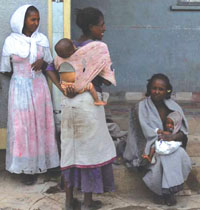Human host factors
Differences in human hosts also affect the pattern of malaria transmission and the severity of the disease. When it comes to malaria, people are either immune, or non-immune. Immune people often have a better chance of tolerating the effects of malaria and surviving the disease than non-immune people. In highly endemic areas, children under five years of age and pregnant women are the most at risk (Figure 6.7), because they have weak immunity to malaria infection. Immunity to malaria develops slowly after several infections and children need at least five years to develop their immunity. Pregnant women have less immunity to malaria due to their pregnancy.

Certain population groups can be infected by some types of malaria parasites, but not by others. For example most Africans south of the Sahara can get infected by falciparum malaria, but not by vivax malaria. This is another reason why most of the disease and deaths due to malaria occur in Africa, because falciparum malaria is the deadliest form of malaria and is highly prevalent in the continent.